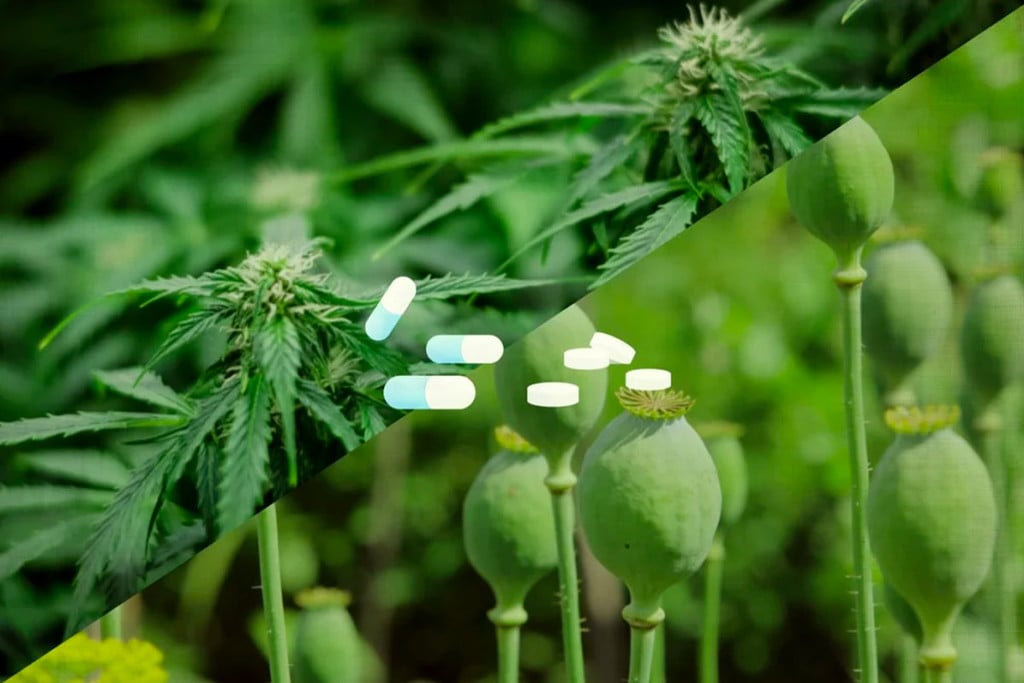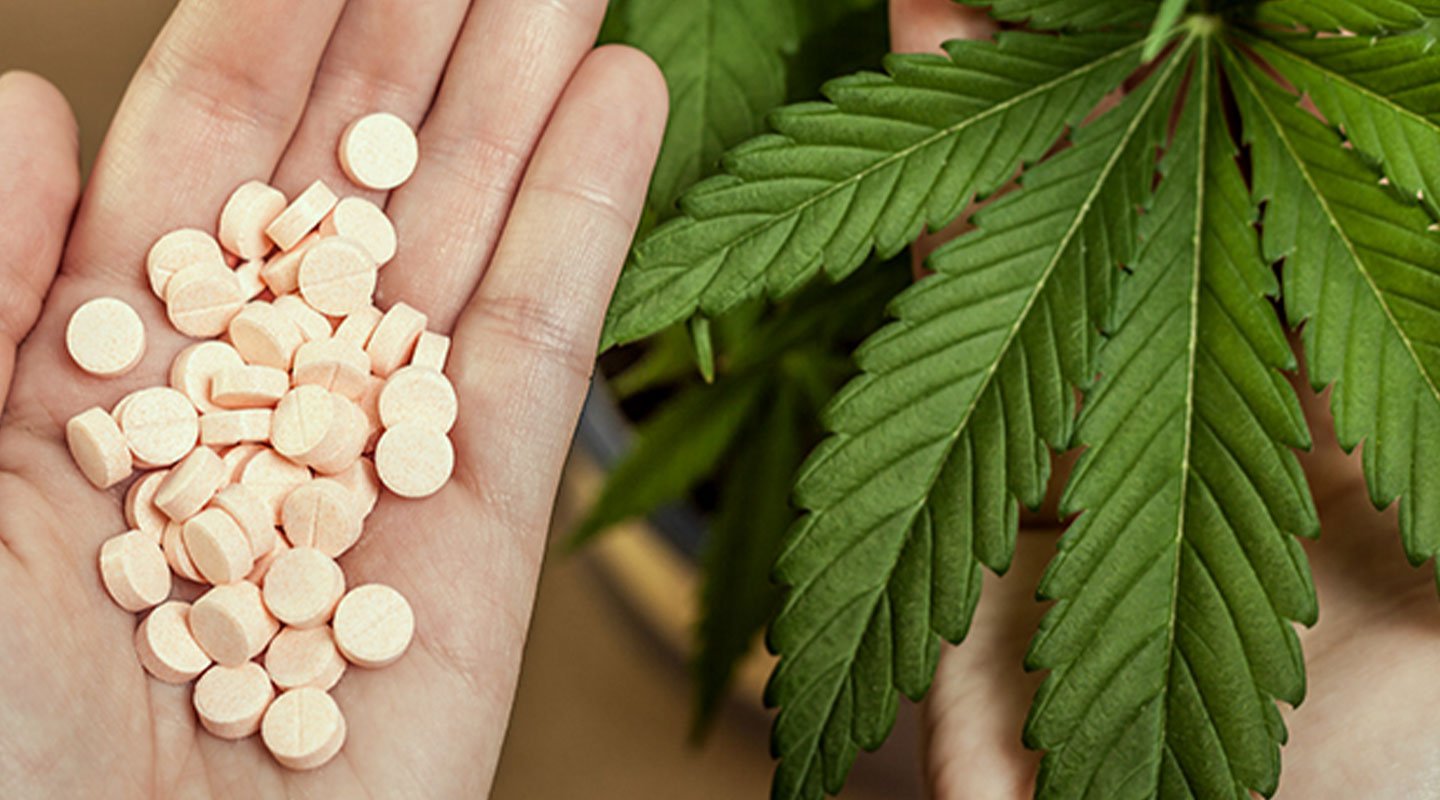.

Opioids & Pain Relief: Could Cannabis Offer An Alternative?
Conditions that cause chronic pain are severely debilitating—and so are opioid addictions. Giving with one hand, and taking away with the other, these drugs are both a blessing and a curse. So what are the alternatives? Here we look at whether cannabis has a role to play in pain management, and if it can impact those already taking opioids.
Contents:
The opioid crisis poses a significant threat to public health, particularly in the US, where its effects can already be seen. Consequently, many are now looking for alternative treatments for their pain—ones that do not cause addiction and fatal overdose.
Much like opium—one of humanity's oldest drugs—cannabis has been with us for millennia. Does it provide an answer to this crisis? Here we investigate whether cannabis has analgesic properties, where the research is currently, and ask, could cannabis provide an alternative to opioids?
What Are Opioids?
Opioids are a class of drugs that act on the body's opioid receptors in the central and peripheral nervous systems and the gastrointestinal tract. They have a long and varied history, being used by humanity for at least 7,000–8,000 years—bringing pleasure, pain relief, visionary experiences, addiction and death.
Derived from Papaver somniferum—the opium poppy—opioids come from opium, the narcotic latex found in the seed pods of the poppy plant. Over history, it has taken many forms, from smokeable opium to laudanum, heroin, morphine, fentanyl and oxycontin.
Opioids concurrently block out pain and cause feelings of euphoria. This makes them highly effective as a medicine for pain relief and gives them the massive potential for abuse. Tolerance develops quickly with opioids, as does addiction. This means that those prescribed opioids for pain relief can soon find themselves turning to them solely for relief from withdrawals.
Highly sought after for their addictive and euphoric properties, opioids have been used to suppress populations by colonial powers[1], fund terrorism[2], and fill the coffers of pharmaceutical companies[3]—all at the expense of the individuals using them.


What Is The Opioid Crisis?
These days, opioids are wreaking their most significant damage in the US. The issue is so bad that it has been dubbed "the opioid crisis", which is no hyperbole. In 2017, the worst year of the opioid crisis so far, deaths due to overdose were estimated at a staggering 70,237. Of these deaths, 47,600 were attributed directly to opioids—that's 68%. To put this figure into perspective, in the same year the number of deaths attributed to conflict and terrorism in the US was put at 9[4].
Perhaps even more tellingly, 1.27 million Americans[5] are currently receiving medication-assisted treatment to deal with opioid addiction.
Disconcertingly, the opioid crisis stemmed from an over-zealous prescription of these drugs as a treatment for all things pain-related. Increasingly powerful drugs were developed, pushed, and handed out to people with little or no oversight. This then spiralled out of control and became an indistinguishable world of treatment, recreational drug-taking and addiction—each becoming the other.
Given how long opioids' destructive nature has been known, how were they so willingly given out in such high quantities?
How Did The Opioid Crisis Happen?
The US opioid crisis is characterised as having 3 distinct phases[6].
| Phase 1—1991 to 2010 |
At this time, pharmaceutical companies began pushing for patients to be prescribed opioids for all manner of pain-related symptoms. To back up this push, a lot started presenting research that opiods posed little risk of addiction or overdose. There is debate over how much of this was down to poor research and how much was deliberate misinformation. Given opioids long and famous history of being addictive, we can only speculate. |
| Phase 2—2010–2013 | Heroin, the cheapest and most readily available opioid, became increasingly popular. Deaths began to soar, with the death rate doubling between 2010 and 2012. Why? 86% of heroin users at the time claim they started out using prescription opioids and then moved onto heroin. |
| Phase 3—2013–present | Synthetic opioids, specifically fentanyl, became more available and pushed the death rate to unprecedented levels. In 2010, 14% of opioid overdoses were due to fentanyl; in 2017, it was 60%. |
| Phase 1—1991 to 2010 |
|
At this time, pharmaceutical companies began pushing for patients to be prescribed opioids for all manner of pain-related symptoms. To back up this push, a lot started presenting research that opiods posed little risk of addiction or overdose. There is debate over how much of this was down to poor research and how much was deliberate misinformation. Given opioids long and famous history of being addictive, we can only speculate. |
| Phase 2—2010–2013 |
|
Heroin, the cheapest and most readily available opioid, became increasingly popular. Deaths began to soar, with the death rate doubling between 2010 and 2012. Why? 86% of heroin users at the time claim they started out using prescription opioids and then moved onto heroin. |
| Phase 3—2013–present |
|
Synthetic opioids, specifically fentanyl, became more available and pushed the death rate to unprecedented levels. In 2010, 14% of opioid overdoses were due to fentanyl; in 2017, it was 60%. |
To lay the blame entirely at the feet of pharmaceutical companies is to oversimplify the matter, though. The Institute of Medicine identified the push of opioids to coincide with an increase in pain[7] and the perception of pain among US citizens. The reasons identified were the following:
- Greater expectations for pain relief
- Musculoskeletal disorders due to an ageing population
- Obesity
- Increased survivorship after injury and cancer
- Increasing frequency and complexity of surgery
It is thought that these factors coalesced into the crisis we see today.
Could Cannabis Be Used Instead Of Opioids?
So what alternatives are there? Focusing on the negatives misses the point that pain treatment is a necessary part of modern medicine. To do away with powerful, pain-relieving medicine would mean committing many people to a massive degradation in terms of quality of life.
Cannabis and its constituent cannabinoids are the subjects of much investigation to determine whether they have pain-relieving properties and how effective these may be. Research is still reasonably young, and concrete conclusions cannot yet be drawn. Nevertheless, there is great cause for hope.
Research Investigating The Effect Of Cannabis On Pain
One thing we do know that immediately gives cannabis an advantage over opioids is that it is non-toxic, non-addictive (physically), and as such has a much better safety profile[8]. Compare the numbers in terms of fatal overdose in 2017:
| 47,600 from opioids | 0 from cannabis |
That's a big difference.
But does cannabis offer a legitimate alternative?
Research published in 2017[9] sought anecdotal evidence from those who used cannabis in relation to their pain—in total, they had 2,897 participants. What they found was that, among those users, feelings towards cannabis were overwhelmingly strong—with many users placing it on a par with opioids, but without the side effects or addiction—not to mention lack of withdrawal symptoms. Moreover, many of those who used cannabis claimed they were able to reduce their reliance on opioids.
A 2017 review[10] investigated the relationship between cannabis and pain and whether there was a difference between inhaled and ingested cannabis. The relationship between inhaled cannabis and non-cancer-related pain management appeared strong. On the flip side, ingested cannabis had a stronger relationship with cancer-related pain management but was weaker elsewhere. They concluded that their research revealed the need to develop a deeper understanding of how cannabis affects pain.
Another 2017 review concluded the same[11]. They recognised that existing clinical studies point towards cannabis having a solid relationship with pain mangement but that the exact mechanisms must yet be identified and understood. Furthermore, whilst overall cannabis appears to have a good safety profile, this too requires further investigation. Finally, they also noted that cannabis appears to have a role in reducing dependence on opioid-related pain relief.
What can we take away from this? Evidence, both anecdotal and clinical, suggests that cannabis has a quantifiable relationship with pain management. However, there remain some issues in a therapeutic sense. Such as, by what mechanisms does it impact pain? How best to administer cannabis, and at what dose? What about the potentially negative side effects of THC? Until these issues are answered, it is difficult to suggest how cannabis may be used in the most efficient way to bring the relief required by a patient.


CBD And Pain Relief
Most of the research has focused on cannabis as a whole. However, more and more research is isolating cannabidiol (CBD). The great interest in CBD arises from the fact that it has no psychoactive properties, few side effects, and has been determined by the World Health Organisation to pose no significant threat to health, nor exhibit any potential for abuse[12].
A review from 2020 investigated CBD's relation to pain[13] management and attempted to present a balanced approach for further study. They concluded that CBD does present effects in relation to pain, but that research is hampered due to the unregulated nature of the market and the absence of medical-grade CBD isolates. They suggest that whilst it holds promise, without a greater understanding of the mechanisms and a more regulated market, adulterated products and bad practices pose their own risks.
Fortunately, CBD has boomed in recent years and is legal in many parts of the world. Therefore it should become easier and easier for researchers to delve deeper as the market develops.
Can You Use Cannabis And Opioids Together?
What about the concomitant use of cannabis and opioids?
A 2020 study investigated nine studies covering 7,222 opioid and cannabis-using participants[14]. It found a 64–75% drop in opioid usage among those who also used cannabis. However, it claims that it could not draw causal inferences from these results. It will be necessary to use this as a stepping stone to more specific research using cannabis and opioids together.
Interestingly, not only is cannabis being investigated for pain management but there is a huge amount of research going into investigating the relationship between cannabis and addiction. Specifically, whether cannabis could help to overcome it. Opioids are one of the addictive substances being investigated, but results are still pending. Could it offer a bridge for those needing to ween off opioids while still managing pain?
Cannabis, Opioids And Pain: What Does The Future Hold?
Opioids continue to pose a significant public health threat, as well as offer relief from pain. What seems clear is that an alternative is, in many instances, necessary. While some chronic cases of pain may warrant highly addictive, opioid-based medications, many others do not. Far from offering relief, these substances cause long-lasting, hard to overcome, and sometimes fatal addiction in many cases.
But does cannabis have a role to play in the story of pain management?
It is currently unclear exactly what role cannabis will come to play in relation to pain and opioids. The mounting evidence makes clear that rigorous research is necessary to discover how cannabis may be able to help those in pain. Furthermore, greater investigation relating to individual cannabinoids such as CBD will help uncover some of the deeper mysteries of the plant, and hopefully of pain too.
Fortunately, cannabis-related legislation seems to be dropping away across the world, and this is making it easier and easier for researchers to investigate the potential effects of cannabis without having to apply for strict and impeding licences.
It seems, in time (and hopefully not too much time), we will offically come to know what cannabis can do for those who suffer from pain.
- Opium wars : the addiction of one empire and the corruption of another : Hanes, William Travis, 1954- : Free Download, Borrow, and Streaming : Internet Archive https://archive.org
- Afghanistan: what the conflict means for the global heroin trade https://theconversation.com
- Lawsuits Lay Bare Sackler Family’s Role in Opioid Crisis https://www.nytimes.com
- Deaths from conflict and terrorism - Our World in Data https://ourworldindata.org
- Opioid Crisis Statistics | HHS.gov https://www.hhs.gov
- Opioid Crisis: No Easy Fix to Its Social and Economic Determinants https://www.ncbi.nlm.nih.gov
- Relieving pain in america: a blueprint for transforming prevention, care, education, and research https://www.tandfonline.com
- DEFINE_ME https://www.jpain.org
- Cannabis as a Substitute for Opioid-Based Pain Medication: Patient Self-Report https://www.liebertpub.com
- Cannabis and Cannabinoids for Chronic Pain - PubMed https://pubmed.ncbi.nlm.nih.gov
- Cannabis and Pain: A Clinical Review - PubMed https://pubmed.ncbi.nlm.nih.gov
- Cannabidiol (CBD) https://www.who.int
- A Balanced Approach for Cannabidiol Use in Chronic Pain https://www.ncbi.nlm.nih.gov
- Medical cannabis for the reduction of opioid dosage in the treatment of non-cancer chronic pain: a systematic review - PubMed https://pubmed.ncbi.nlm.nih.gov






































